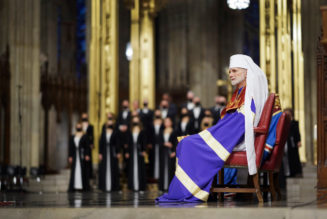, December 10, 2020
This Sunday, the Third Sunday of Advent, Year B, Gaudete Sunday, Jesus is still absent from Sunday’s Gospel, but nonetheless the Church says “rejoice.”
The readings even give the key to rejoicing: humility. It’s a paradox we easily miss. We can’t be joyful without being humble — and we can’t be humble unless we are “humiliated” according to Mother Teresa and “despised” according to St. Gregory the Great.
Only one person in the Gospel reading today is more humble than John the Baptist.
John is placed before us again as a great example of humility in his life, message and self-understanding. He eats bugs in the desert dressed in a hide, repeats “Repent!” to his audiences, and endlessly proclaims “I am not the Christ.”
“I am not the Christ” means “I am not the anointed one;” I am not the fulfillment of all those anointed roles in the Old Testament: king, prophet and priest. The Christ is the ultimate ruler; the ultimate truth-teller; the ultimate intermediary of God and man. Not me.
The case for John, rather than Jesus, being the Christ was strong: John came from a priest’s household, not a carpenter’s. John’s mother, a descendant of the high priest and prophet Aaron, had been barren for many years, like the mothers of so many of the prophets. “All Jerusalem” went out to meet John, while Jesus was known only locally in Nazareth as a carpenter’s son.
But look at how John describes Jesus: “there is one among you whom you do not recognize, the one who is coming after me, whose sandal strap I am not worthy to untie.”
Now that’s humility; Jesus is greater but he remains “one among you who you do not recognize.” He is an ordinary worker living in an ordinary way despite his extraordinary identity. He has the same humility in our day: He is among us still, unrecognized in the Eucharist and in the least ones we meet.
We are meant to have the humility of Jesus and John.
We, also, are ordinary people with a secret identity as adopted children of God. And at the same time we are pointers to Christ, like John.
Yet many of us are not satisfied with being ordinary, and we point to ourselves, not to Christ. Our schools train us from a young age to consider ourselves special, the most common theme in our entertainment media is that we have to “believe in ourselves” for “our dreams will come true.” We decide who we will be, from our carefully curated social media profiles to, in some cases, our very gender.
The only way to experience the joy of Christ is to stop seeing ourselves as our own creation in the center of our own world, and remember that we were recently nothing and will soon die, and owe everything we have and are, to God.
In The Lion, the Witch and the Wardrobe, C.S. Lewis describes how the name of Jesus brings either joy or dread. He explains what it was like for Edmund, the traitor, and his brothers and sisters, the faithful, to hear the name Aslan, who is the Christ of the land of Narnia:
“At the name of Aslan, each of the children felt something jump inside them. Edmund felt a sense of mysterious horror. Peter felt suddenly brave and adventurous. Susan felt as if a delicious smell or a beautiful bit of music had just floated by her. And Lucy got the feeling you have when you wake up in the morning and realize that it is the beginning of the holidays or the beginning of summer.”
The news that a better, greater and more powerful person is coming is a comfort to the weak and a threat to those who think they are great and powerful. It brings us joy if we are humble, and makes us bitter if we are proud.
St. Paul points to another source of joy: Intellectual humility. We see how this works in church communities.
By the same token, the idea that a truth exists that is capable of correcting me is a comfort to the docile and open-minded and a threat to the proud and close-minded.
“Do not quench the spirit,” St. Paul says in the Second Reading. “Test everything; retain what is good. Refrain from every kind of evil.”
This is intellectual humility: The humility to accept new ideas and reject pet theories, based solely on their truth. The Pharisees in the Gospel didn’t have intellectual humility — they were so stiff in their rigidity that even the breeze of the Holy Spirit couldn’t bend them. The Sadducees also lacked intellectual humility. They had gotten so used to compromising with the Roman rulers that it was too painful to submit to the Holy Spirit’s plan to straighten what was crooked in them. So the Pharisees and Sadducees in Sunday’s Gospel joylessly confront John the Baptist together, asking questions whose answers they aren’t willing to hear.
You can tell when a church community is like the Pharisees. They will appear bitter and angry and always ready to tell you just how wrong everyone else is. You can also tell when a church community is like the Sadducees. Their superficial joy darkens to rage if you insist on moral truths that challenge their lifestyle.
St. Paul describes what a healthy church community, open to the Spirit, will look like. It will “Rejoice always,” “pray without ceasing” and “in all circumstances give thanks.” Think of the group of religious sisters you find most attractive. These are probably the qualities you see in them: Their humility makes them happy, holy and grateful.
In Sunday’s “Psalm” reading, we get the example par excellence of humility that leads to joy.
Sunday’s “Psalm” isn’t a Psalm at all, but is the Magnificat prayer of Mary from the Gospel of Luke, words she shared with her cousin Elizabeth, the mother of John.
The irony should not be lost on us. The Gospel’s two examples of humility were John prophesying about the coming Messiah and Jesus unnoticed in an ordinary life. But this reading shows two women who were both: They prophesied while being unnoticed in their ordinary lives.
Before this reading, Elizabeth has just prophesied that Mary is “the mother of my Lord,” and Mary here proclaims that “My soul proclaims the greatness of the Lord.” Elizabeth and Mary foreshadow the humility of John and Jesus.
Mary “rejoices in God,” because of her humility, “for he has looked upon his lowly servant.” We can experience the same thing if we are humble, she says: His mercy doesn’t come to everyone, but to “those who fear him in every generation.” He sends away the rich and fills up the hungry. It is also telling that Sunday’s First Reading is taken from two parts of Isaiah’s prophesy, verses 1-2, which Jesus identifies with and 10-11, which Mary identifies with.
Christ will later proclaim himself to be the one who brings glad tidings to the poor, heals the brokenhearted, proclaims liberty to the captives and releases the prisoners. It is Marian receptivity in the second half that makes God “the joy of my soul” clothes me with “a robe of salvation … a mantle of justice” and makes the soul “a bride bedecked with her jewels.”
“The lowliness of Mary was made the heavenly ladder, by which God descended upon earth,” says Augustine, and if he comes with joy into our lives again this Christmas, it will only be by the same ladder of humility.
Tags: prayer, Sunday Gospel, Sunday Readings, Third Sunday of Advent Year B
Never miss a post! Subscribe below to our weekly newsletter.
Related
Join Our Telegram Group : Salvation & Prosperity









